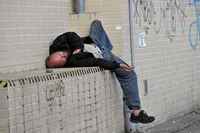Prague, Homeless 'camp' idea slammed
Proposal for 'oasis' to clean up city image sparks fury
Plans under consideration to place homeless people "in an oasis" in the Prague suburbs have been slammed as nothing more than setting up "a concentration camp" and putting people in a "ghetto."
Prague City Councilor Jiří Janeček (ODS), a former member of the Chamber of Deputies, described his proposal to move the "unsightly" homeless out of the city center to an as yet unspecified location in the suburbs as providing "a safe oasis for the homeless where they can get soup twice a day and receive medical attention."
"We have to force homeless people who do not want to accept anything out of the city center. They are a sanitary and safety risk, and they are not nice to see. No one will force them to stay," but they know this is their best option, he said.
But Janeček's proposed camp came under criticism from organizations trying to help the homeless.
"It won't be an oasis. It will be a concentration camp," said Eduarda Heczková, of the NGO Dům Agapé, which assists homeless people. "For these people, it is a massive insult. They need to be integrated, not put aside and moved away."
Dagmar Kocmánková, co-founder of Nový Prostor - a Prague magazine sold by and for the benefit of homeless people - says the homeless must be integrated into society.
"It is just putting them in a ghetto far away from other people. That is not the way to treat the homeless," she said. "The homeless need secure buildings for their safety, and they need to be integrated into society. They must be given the opportunity to find work and be made part of society, not just shunted away."
Homeless people face discrimination daily and are often subjected to abuse when they sell the magazine with people shouting "You're rubbish," and "Why don't you just get out of the way?" she said.
Kocmánková said those who attacked or insulted homeless people are often young drunks or people with their own problems taking them out on the homeless.
The plight of the homeless has not attracted much attention from city authorities. The last official count of the homeless in Prague was done in 2003, and that figure of 3,500 "has risen dramatically," Kocmánková said.
"It is at least 6,000 now and probably much higher. It is also bound to increase in the coming years as more companies close down and unemployment and poverty levels rise," she added.
The Labor and Social Affairs Ministry does not have up-to-date figures on the homeless situation, spokeswoman Štěpánka Filipová said.
"The ministry is not monitoring the situation; at least, we don't have any analysis showing the real figures of homeless people," she said. "However, this year is European Year Against Poverty and Social Exclusion. Within this there are a lot of possibilities, e.g. nonprofit organizations can ask for donations for projects helping homeless people."
Poverty is a leading cause of homelessness, Kocmánková said. The European Union defines poverty as people with an income below 60 percent of the median income.
The homeless population in the Czech Republic has been estimated at about 35,000, approximately 0.35 percent of the total population. That would make the homeless proportionately half as numerous as in the average West European country.
"Even though we have at least 6,000 homeless in Prague, we have only daily accommodation to cater for 1,500, including the Hermes boat, which houses about 250," Kocmánková said.
In 2007, City Hall established the Hermes floating shelter for the homeless, after it found it difficult get the permission to build a facility on land.
Women make up about 15 percent of the homeless population and are vulnerable to pimps who want to force them into the sex industry. Alcoholism and drug addiction also worsen the conditions in which the homeless live, according to experts.
- Filip Šenk contributed to this report.

